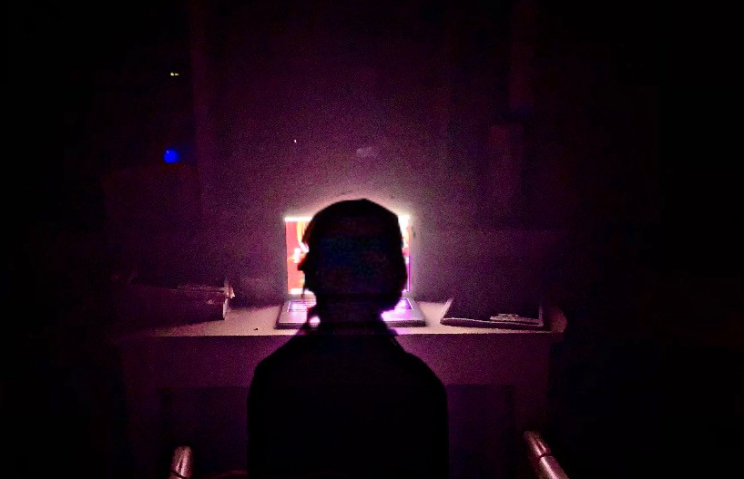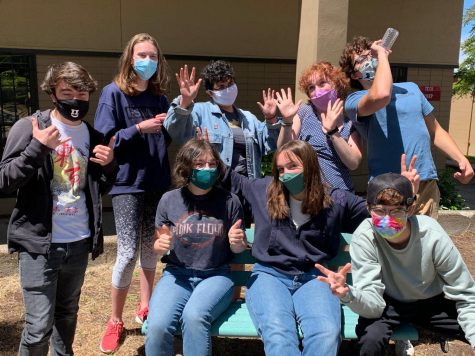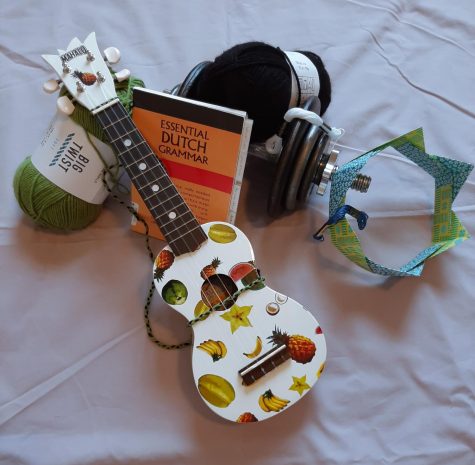The Effect of Online Learning on Teenagers
The outline of a student staring at a computer screen while surrounded by a purple haze.
In recent months, students have been forced to learn from a computer each day, which has taken a toll on the mental health of kids all over the world. A recent study cited by USA Today showed that three in ten students are experiencing emotional or mental harm, and over half of the students surveyed said they need more mental health services or support since school closures. The last eight months have been especially tough on the students of Ashland High School. The current pandemic – as well as the recent fires – has affected every teen at AHS in one way or another. While some are dealing with the difficulties of navigating online school, others are grieving the loss of a friend or family member at the hands of COVID-19, and more are struggling to recover from losing a home. However, one thing can be said for sure: every student and teacher at AHS is fighting their own emotional and mental hardships moving toward the fast approaching winter months.
In an effort to learn more about the challenges teens are facing with their mental health, I spoke with Suni Teker, a Licensed Clinical Social Worker who counsels teens and adults here in Ashland. Teker explained the importance of in-person connection during difficult times. “I think people are starving for that in-person dynamic, and it’s so important, more than ever right now, to safely have human connection.”
She also stressed the importance of exercise, taking time for self-care, and getting sleep. She shared, “It’s critical that you’re making a vital effort to move, and also reach out to talk to people. The very act of talking to someone makes you feel better.” She strongly advises calling a friend or even making a small quarantine group (pod) so as to not feel so alone.
The new school year has brought a wave of difficulties that come with using an unfamiliar distance learning platform. When asking Vashti Johnson, a sophomore at AHS, how this year of distance learning was going for her, she replied, “It’s been a learning experience that has definitely been stressful at times, but I think it’s getting better.”
Like many others, Johnson has been struggling to adjust to completing all her assignments online, but she also expressed how this year’s learning platform has been much more efficient for her than last semester. She elaborates, “[the schedule] has much more structure which helps me.” Johnson went on to state that since we’re now on a regular routine, she finds it easier to feel productive to get her work done. However, along with many others, online school has not been exactly easy for Johnson. She explained, “I don’t think that the amount of stress that has been on our workload has been reflective of what’s been going on in the student’s lives.” Similarly, another student (who prefers to stay anonymous) confessed, “I really dislike how teachers call on kids who aren’t volunteering, because this is such a hard time to get used to and everyone is dealing with different levels of stress.”
While taking time to care for oneself, it is imperative to show compassion to your family, teachers, and fellow classmates, as you never know what the person sitting next to you (or next to you in your zoom class) is going through. At times it can be difficult to have any sense of optimism, but as Teker said, it can be a great help to find small things that contribute to your happiness and overall well-being.
That said, you are not alone. If you are ever feeling depressed, suicidal, or just need someone to talk to, make an appointment with an AHS counselor, or feel free to consult the list of resources below. No matter how isolating the world can feel at the moment, there are always people who are there for you, and care about your mental well-being.
– National Suicide Prevention Lifeline: 800-237-8255
– Text HOME to 741741 for free, 24/7 Crisis Counseling
– Oregonyouthline.org
talk: 877-968-8491
text: teen2teen to 839863 to talk with a trained teen every day from 4-10pm










